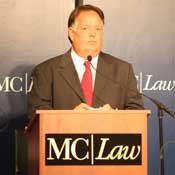Ron Williams, 52, is a Republican candidate for governor and a vocal critic of what he claims to be state agencies' preferential treatment of contractors who donate to politicians.
Williams attended Pascagoula High School and Mississippi State University and now runs Hazmat Services Inc., a hazardous material handling service in Pascagoula with his wife, Towana. Prior to being in that line of work, he was a ship's captain in the Merchant Marines. He has two sons and two daughters, and two grandchildren.
What made you decide to run?
For the last 22 years, my wife and I have been successful with our business based on our faith, our sweat and our hard work, but the reality of it is the last five or six years we've spent more time fighting with Jackson ... than we have looking for work for our people. It culminated during the oil spill, but this has been going on for years.
During the oil spill you had a lot of government officials who put themselves in a position to profit from the oil spill through relationships that would get them consultant projects, specialty contracts and things of that nature. ... Here's the reality of it: Our government agencies took so much money from BP directly, and used it for very questionable things that benefited many of them personally, that we don't know who to trust anymore.
You say they got money from BP, and it's been used for questionable things; can you give an example of that?
Sure. A lot of agencies had leftover, excess money that had nothing to do with the oil spill, and they went out and bought new SUVs and Tasers—toys. They bought toys that made their positions a little more enjoyable. ... This was in an Associated Press story. ... As a Mississippian, I want a government I can trust. I want a government that is up there looking out for me, the working person.
What would you say makes you different from the other candidates?
I am the only candidate who has started a business from the ground up, without any other connections or any other sources, and that's a fact. ... What separates me is that I have a passion for this. I have spent our fortune, such as it is, on this campaign, because it's not about money to me—it's not about connections. It's about creating a state so my children and other young people can have the same opportunities that my wife and I have had. And if you just work hard, and do your best, you'll be successful.
How do you think, as governor, you could help more people find jobs?
We've got to remove obstructions that keep people from coming into our state. For example, what (Lt. Gov.) Phil (Bryant) said the other day in the debate was this: We ... made some arrangements so that the furniture industry could have 800 more jobs. What that tells me is that for years there was a tax structure in place that was preventing 800 people from having jobs. Why weren't they put in place to begin with?
You talk a lot about ending no-bid contracts. Can small businesses compete with big businesses?
Most of the no-bid contracts are going to larger contributors; they're not going to small businesses. ... We need to reach out to our small businesses, help them grow by getting them into in-state contracts. Once they get to a certain point, then they're strong enough and large enough to get out and compete on the national level and bring revenue into our state.
Have you ever held a political office?
No, and I consider that a great asset, because I have not been tempered, trained or any way predetermined to be some sort of a wheeler-dealer, back-room-negotiating kind of guy. It's quite simple. The idea that a person who has never held a political office is unqualified to be governor is completely ridiculous. Making the right decisions, doing what's right—it really doesn't require a lot of practice. It requires an honest mentality, integrity and an openness in how you handle the people's business. And that's not politics, that's just life.
You've said that even if you don't win the primary Aug. 2, you can wake up Aug. 3 and feel that you've accomplished something.
A lot of people (I have met) have gotten back in the voting game ... that weren't going to vote at all. ... They say they've listened to me, and they've read our flier, and they want to help us. We have a lot of people who have become so disillusioned that we would never have a chance to change the way government works in Mississippi, and now they feel like we have a chance, and they're working hard to do that. If I have given anybody faith to get re-involved in our political process for the good of our state, I consider that a success.
To read more candidate interviews and more political news, visit http://www.jfppolitics.com and follow @jfppolitics on Twitter.



Comments
Use the comment form below to begin a discussion about this content.